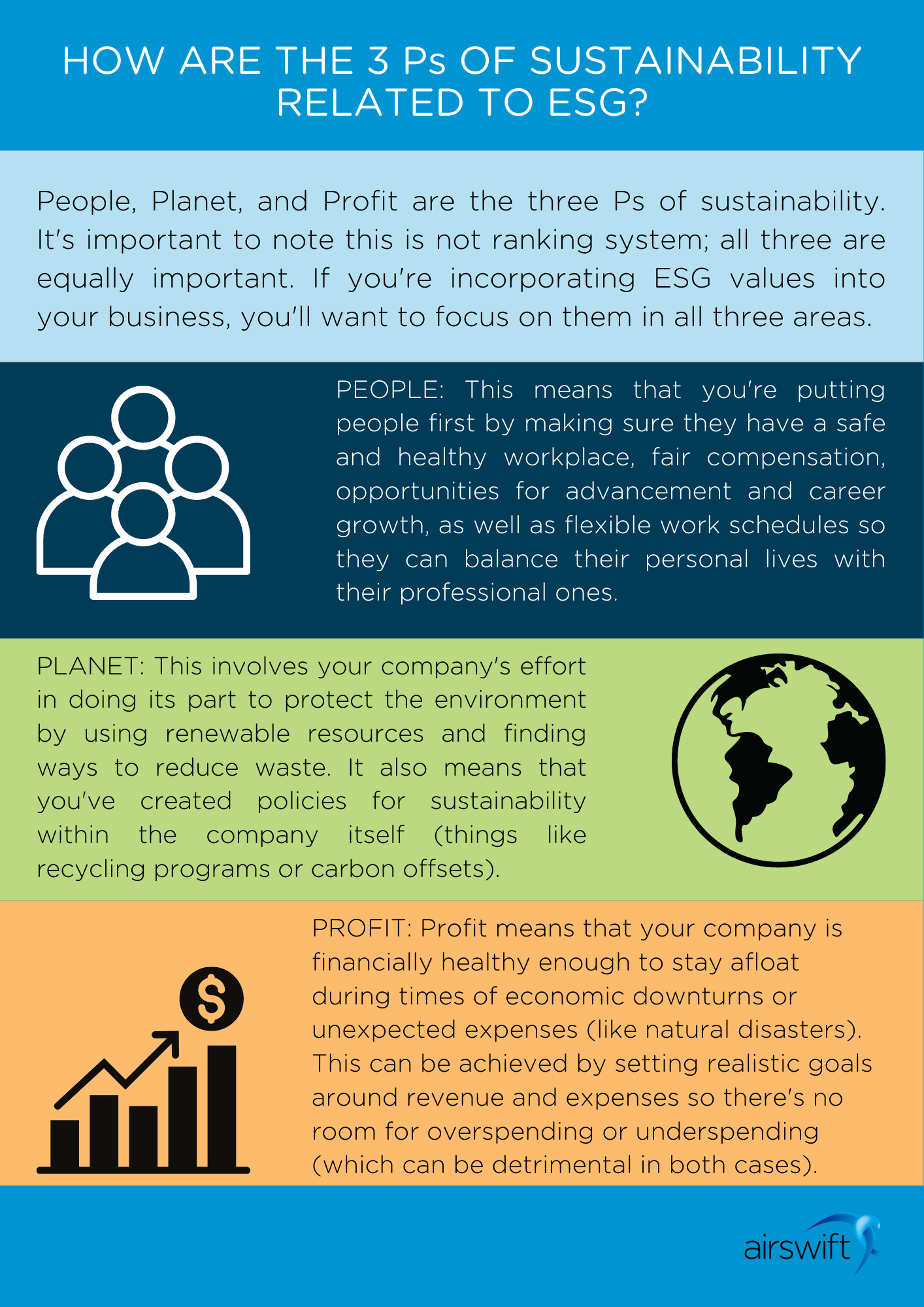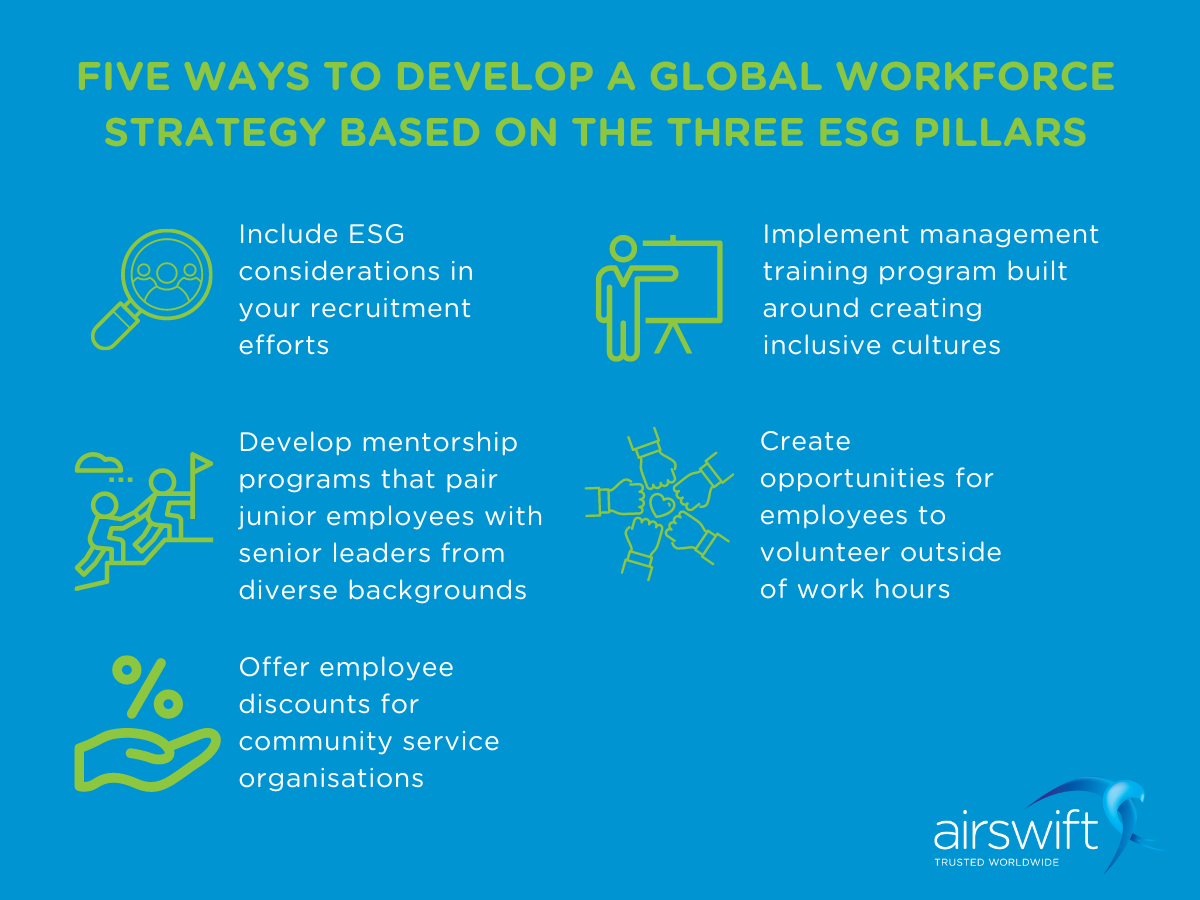
By
Diyaa Mani
August 14, 2024
Updated
November 7, 2024
In the aftermath of COVID-19, business leaders are revisiting their talent strategies.
Historical pandemics like HIV/AIDS show how companies might prioritise immediate goals over long-term resilience.
ESG criteria, once mainly for impact investors, are now recognised by various stakeholders.
Sustainability-linked loans are rising, with rates tied to ESG performance. In 2019, these loans hit $122 billion, up 168% from the previous year.
Regulatory bodies, influenced by the European Commission's Action Plan on Sustainable Finance, are increasing scrutiny of ESG disclosures. Credit-rating agencies are also offering ESG evaluations.
Consumers are more mindful of ESG performance, with 64% choosing brands based on social responsibility.
Research indicates that organisations with ESG (Environmental, Social, and Governance) strategies are better equipped to navigate these changes. Embrace ESG as a global workforce strategy to ensure sustainable growth, ethical practices, and long-term resilience.
This guide for business leaders will help you integrate ESG principles to create a responsible and adaptable workforce.
What is ESG?
ESG is a framework for managing environmental, social, and governance risks and opportunities across an organisation.
ESG factors impact operational performance and financial returns, offering a broader perspective on business performance beyond economics.
Addressing ESG issues can enhance corporate reputation, brand value, customer loyalty, employee retention, and investor confidence.
ESG: Serving the three pillars
ESG is essential for your global workforce strategy, connecting the pillars of people, planet, and profit. It influences every aspect of your business, from recruiting and retention to employee engagement and performance management.
Beyond corporate responsibility, ESG drives long-term profitability. Implementing sustainable practices and energy efficiency helps organisations:
- Retain top talent by fostering a positive impact culture
- Improve financial performance by reducing costs from safety incidents and environmental damage
- Avoid legal expenses from discrimination lawsuits based on age, race, ethnicity, or gender identity/expression.

How do the three components of ESG contribute to an effective global strategy?
Environment
Organisations must focus on environmental issues to build an effective global workforce strategy. Many job seekers are concerned about their carbon footprint and favour companies with minimal environmental impact.
To ensure compliance with the highest environmental standards, consider these questions:
- How can we develop a global workforce strategy based on sustainable practices?
- What energy sources will our facilities worldwide need?
- How do we reduce water usage while maintaining product quality?
- How can we reuse waste products within our factories?
Social ethics and responsibilities
Social ethics and responsibilities are the cornerstones of a responsible business.
Integrating ESG factors into business strategies drives positive outcomes, including satisfied employees and investors.
Key drivers for ESG include:
- Integrating environmental, social, and governance factors into business strategy.
- Involving all stakeholders, including employees, management, and customers, in the investment process.
- Taking a long-term view rather than seeking short-term profits.
To meet your social responsibilities:
- Make investment decisions based on strong financial metrics.
- Engage with companies to understand ethical and social issues, including human rights.
- Monitor ESG factors over time and commit to ongoing improvement.
Governance factors (political, regulatory, legal, and ethical)
Effective corporate governance is essential for achieving organisational goals. This includes political, regulatory, legal, and ethical business practices. Managing a global workforce requires:
- Understanding international laws and tax implications.
- Navigating cultural differences in business behaviour.
- Adhering to local customs in each country of operation.
Strong leadership at all organisational levels is critical for success, ensuring actions positively impact both local and international stakeholders.

How can we develop a global workforce strategy based on the three ESG pillars?
ESG issues affect every industry and company, regardless of size or geography. Addressing these challenges requires local-level solutions and integrating sustainability into core business models.
Companies are realising they are not alone in facing these issues, with peers across industries and geographies working on similar problems with various solutions. The board of directors plays a crucial role in navigating these governance issues and ensuring alignment with corporate policy.
To build a global workforce strategy using ESG principles, follow these three steps:
Map and identify local values
- What are the most important values of your organisation?
- What does "local" mean to you in this context?
- How do these values align with your corporate policy and ethical standards?
Define ESG-based hiring criteria and practices for each location
- How can we leverage data sources to identify local hiring options that align with our ESG-based goals?
- How can we implement these practices to increase our attractiveness to talent and enhance social impact?
Build an ecosystem that supports growth and change
- How can we support talent acquisition efforts across all locations?
- What resources are needed to support these endeavours?
- What is required to scale up from a technical and operational perspective?
By integrating these steps, companies can ensure their workforce strategies align with ESG goals, addressing governance issues and promoting ethical standards.

Be prepared to thrive in a volatile world
Companies need to be prepared to face changes at any time. This means being ready for change and adapting promptly to obstacles.
In a world where things can happen at any moment—a natural disaster or an economic downturn—you must be able to cope with uncertainty and disruption. Achieving this goal involves a team of diverse professionals spanning various departments, seamlessly working together across borders, cultures, and languages.
To do this, open communication channels between management teams around the globe are essential.
Hence, everyone stays informed about decisions made in one part of the world that could impact operations elsewhere around the globe.

Influential leaders can adapt quickly to change
A key lesson from the COVID-19 pandemic is that the most influential leaders will be those who can adapt quickly to change. For example, consider how quickly Walmart changed its strategy following the pandemic.
The company went from one of the largest retailers in America to a smaller store with limited supplies within two months following COVID-19.
The leadership required to make such a radical transition is not easy; however, it demonstrates how much impact you can have on an organisation when you can adapt quickly and address challenges effectively during difficult times.
Adapt your workforce strategies and priorities
Your company's workforce strategy and priorities will require adaptation. Specifically, you'll need to consider the ESG framework as an essential part of your business operations—not just as a good thing in and of itself.
It can also serve as a critical foundation for more resilient business operations.
Create a foundation for more resilient business operations
ESG is a way to ensure you have the right people in the right places, with the right skills and drive to make a difference. In addition to helping ensure your workforce is engaged and invested in their work, ESG can help you navigate difficult times.
When it's time for change — whether macroeconomic shifts or business-specific issues drive it — ESG can help your organisation be more prepared for what comes next.
Build resilience to increase sustainability and withstand disruptions
Resilience is the ability to withstand disruptions. ESG strategies can help companies build resilience by improving their ability to stay in business when storms hit, or pandemics spread.
Corporate sustainability strategies will ensure your company's ability to endure over time. In other words, sustainability means that a company will be around tomorrow—or at least for as long as you need them!
It's essential for companies who want your business now and in the future.
Build resilience by fostering employee engagement, well-being, and satisfaction
You may have heard that ESG is vital for your bottom line. There are also many benefits of ESG to you and your employees. Here are a few examples:
- Employees are happier and more productive
- Employees are more engaged
- Employees have better health
- Employees are more likely to stay with the company
- Employees are more likely to recommend the company to others

Bolster talent acquisition and retention efforts
As a result of growing awareness around ESG issues, a vast majority of employees are increasingly demanding that their employers take action to support more sustainable growth practices.
In fact, according to studies on employee engagement and sustainability, about 64% of millennials stated that a company's social and environmental factors are important when selecting jobs, and 83% would be more loyal to a company if their jobs could positively impact society.
The good news is that companies can address these rising demands in several ways—and in doing so, they can also bolster talent acquisition and retention efforts by addressing rising employee demands around sustainability. For example:
Companies can incorporate ESG factors into job descriptions, so potential hires know if this is an area where they want to work before deciding about accepting an offer.
Employers can offer training or certifications for employees who want additional knowledge about how ESG impacts their work or industry but may not have the time for formal training programs like many colleges provide today.
Be better equipped to adapt to change
ESG can be a competitive advantage. The world's most successful companies are already using ESG to build their brands, attract and retain talent, gain market share, and build their reputation as good employers.
These companies also have an advantage with millennials as this cohort makes up most of the current workforce.
Companies with ESG strategies are better equipped to address this advance of change than others because they're focused on building long-term value for stakeholders through responsible leadership and governance practices.
Besides addressing key issues like the focus on climate change, these companies also have a firm grasp on societal issues and staff satisfaction.
Let Airswift support you in your global business endeavours
As the pressure to establish ESG standards grows, more companies integrating them into their global workforce strategies.
An ESG-driven workforce management approach involves applying ESG principles in recruiting, assigning, and developing global talent.
As you focus on implementing your ESG values locally or internationally, and let Airswift handle the rest
Our Employer of Record (EOR) services provide key services in managing payroll, immigration, visas, relocation, and other HR-related tasks so you can focus on the core services of your business.
Get in touch with us to learn more about how Employer of Record (EOR) services can benefit your organisation.
